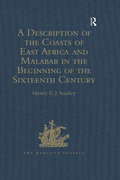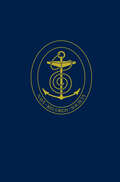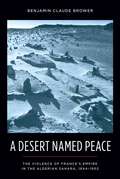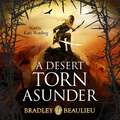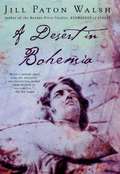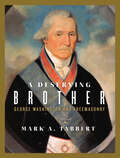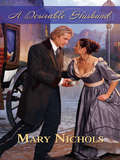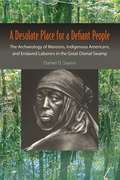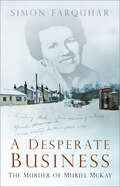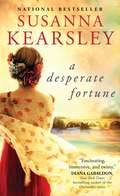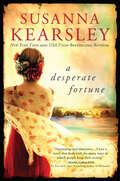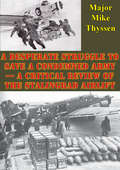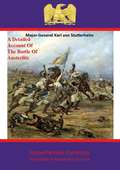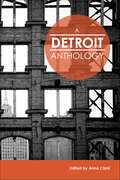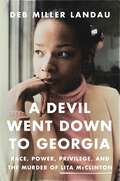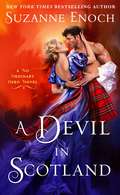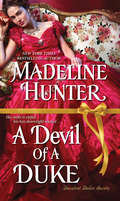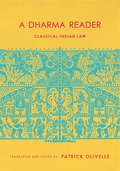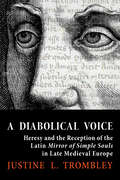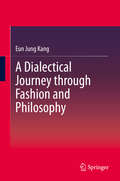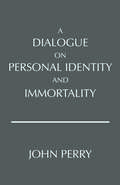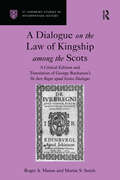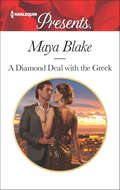- Table View
- List View
A Description of Millenium Hall, and the Country Adjacent: Together With The Characters Of The Inhabitants, And Such Historical Anecdotes And Reflections, As May Excite In The Reader Proper Sentiments Of Humanity, And Lead The Mind To The Love Of Virtue
by Sarah ScottIn 1762, English novelist Sarah Scott published her most successful novel, A Description of Millenium Hall and the Country Adjacent.The book takes the form of a frame tale and a series of adventures, as the narrator’s long-lost cousin relates how each of the residents arrived at the female Utopia, Millenium Hall. The adventures are remarkable for their reliance on a nearly superstitious form of divine grace, where God’s will manifests itself with the direct punishment of the wicked and the miraculous protection of the innocent. In one tale, a woman about to be ravished by a man is saved, literally by the hand of God, as her attacker dies of a stroke. The Hall the characters live in is a model of mid-century reform ideas. All the women have crafts with which to better themselves. Property is held in common, and education is the primary pastime.The author’s sister, Lady Elizabeth Montagu, had become a leader of the bluestockings, a coterie of reform-minded individuals. They believed in female equality, education, and limited economic justice. They were also active in prison and health care reform. Although Elizabeth may be lightly satirized in the figure of Lady Brumpton in Millenium Hall, the Hall is a fictional embodiment of bluestocking ideals.
A Description of the Coasts of East Africa and Malabar in the Beginning of the Sixteenth Century, by Duarte Barbosa, a Portuguese (Hakluyt Society, First Series)
by Henry E. J. StanleyTranslated from an Early Spanish Manuscript in the Barcelona Library, with Notes and a Preface from the Text written c. 1514. For a revised edition, see Second Series 44, 49. This is a new print-on-demand hardback edition of the volume first published in 1866.
A Descriptive Catalogue of the Naval Manuscripts in the Pepysian Library: Vol. I
by J.R. TannerSamuel Pepys (1633-1703) made a significant contribution to British history by his work as a naval administrator, and he bequeathed to Magdalen College, Cambridge its greatest treasure – his library, a unique collection of 3,000 books and manuscripts, still preserved as he left it. There are 250 volumes of manuscripts and these NRS volumes published selected documents from the collection.In this volume Tanner gives a lengthy general introduction to Pepys’s career as a naval administrator and to the papers he left at his death, and also prints from them lists of ships and officers from 1660 to 1688.
A Desert Named Peace: The Violence of France's Empire in the Algerian Sahara, 1844-1902
by Benjamin Claude BrowerIn the mid-nineteenth century, French colonial leaders in Algeria started southward into the Sahara, beginning a fifty-year period of violence. Lying in the shadow of the colonization of northern Algeria, which claimed the lives of over a million people, French empire in the Sahara sought power through physical force as it had elsewhere; yet violence in the Algerian Sahara followed a more complicated logic than the old argument that it was simply a way to get empire on the cheap. A Desert Named Peace examines colonial violence through multiple stories and across several fields of research. It presents four cases: the military conquests of the French army in the oases and officers' predisposition to use extreme violence in colonial conflicts; a spontaneous nighttime attack made by Algerian pastoralists on a French village, as notable for its brutality as for its obscure causes; the violence of indigenous forms of slavery and the colonial accommodations that preserved it during the era of abolition; and the struggles of French Romantics whose debates about art and politics arrived from Paris with disastrous consequences. Benjamin Claude Brower uses these different perspectives to reveal the unexpected causes of colonial violence, such as France's troubled revolutionary past and its influence on the military's institutional culture, the aesthetics of the sublime and its impact on colonial thinking, the ecological crises suffered by Saharan pastoralists under colonial rule, and the conflicting paths to authority inherent in Algerian Sufism. Directly engaging a controversial history, A Desert Named Peace offers an important backdrop to understanding the Algerian war for independence (1954-1962) and Algeria's ongoing internal war, begun in 1992, between the government and armed groups that claim to fight for an Islamist revolution.
A Desert Named Peace: The Violence of France's Empire in the Algerian Sahara, 1844-1902 (History and Society of the Modern Middle East)
by Benjamin BrowerIn the mid-nineteenth century, French colonial leaders in Algeria started southward into the Sahara, beginning a fifty-year period of violence. Lying in the shadow of the colonization of northern Algeria, which claimed the lives of over a million people, French empire in the Sahara sought power through physical force as it had elsewhere; yet violence in the Algerian Sahara followed a more complicated logic than the old argument that it was simply a way to get empire on the cheap. A Desert Named Peace examines colonial violence through multiple stories and across several fields of research. It presents four cases: the military conquests of the French army in the oases and officers' predisposition to use extreme violence in colonial conflicts; a spontaneous nighttime attack made by Algerian pastoralists on a French village, as notable for its brutality as for its obscure causes; the violence of indigenous forms of slavery and the colonial accommodations that preserved it during the era of abolition; and the struggles of French Romantics whose debates about art and politics arrived from Paris with disastrous consequences. Benjamin Claude Brower uses these different perspectives to reveal the unexpected causes of colonial violence, such as France's troubled revolutionary past and its influence on the military's institutional culture, the aesthetics of the sublime and its impact on colonial thinking, the ecological crises suffered by Saharan pastoralists under colonial rule, and the conflicting paths to authority inherent in Algerian Sufism. Directly engaging a controversial history, A Desert Named Peace offers an important backdrop to understanding the Algerian war for independence (1954-1962) and Algeria's ongoing internal war, begun in 1992, between the government and armed groups that claim to fight for an Islamist revolution.
A Desert Torn Asunder
by Bradley BeaulieuThe final book in The Song of the Shattered Sands series closes the epic fantasy saga in a desert setting, filled with rich worldbuilding and pulse-pounding action.The plans of the desert gods are coming to fruition. Meryam, the deposed queen of Qaimir, hopes to raise the buried elder god, Ashael, an event that would bring ruin to the desert.Çeda and Emre sail for their ancestral home to bring the traitor, Hamid, to justice. To their horror, they discover that the desert tribes have united under Hamid's banner. Their plan? A holy crusade to destroy Sharakhai, a thing long sought by many in the tribes. In Sharakhai, meanwhile, the blood mage, Davud, examines the strange gateway between worlds, hoping to find a way to close it. And King Ihsan hunts for Meryam, but always finds himself two steps behind.When Meryam raises Ashael, all know the end is near. Ashael means to journey to the land that was denied to him an age ago, no matter the cost to the desert. It now falls to Çeda and her unlikely assortment of allies to find a way to unite not only the desert tribes and the people of Sharakhai, but the city's invaders as well. Even if they do, stopping Ashael will cost them dearly, perhaps more than all are willing to pay.
A Desert in Bohemia
by Jill Paton WalshTold through the eyes of nine characters who live through the 40 years between the end of the war and the fall of Communism, this book is a complex and enthralling testament to the power and powerlessness of the individual in challenging times.
A Deserving Brother: George Washington and Freemasonry
by Mark A. TabbertLike several of America’s founding fathers, George Washington was a Freemason. Yet Washington’s ties to the fraternity and the role it played in his life have never been widely researched or understood. In A Deserving Brother, Mark Tabbert presents a complete story of Washington’s known association with Freemasonry.Much more than a conventional history, this book has curated an exhibition of artifacts and episodes to fully contextualize our first president’s Masonic life and experiences. Consulting the Library of Congress, Mount Vernon, the Boston Athenaeum, and numerous private Masonic lodges, libraries, and museums, Tabbert chronicles all known instances of Washington’s association with Freemasons, confirming some existing knowledge, adding new insights, and debunking unsubstantiated myths. The record of Washington’s Masonic ties is presented through contextualizing descriptions and color illustrations, ranging from lodge minute books recording Washington’s attendance, to his Washington’s Masonic aprons, from the tools used at the U.S. Capitol cornerstone ceremony to the Grand Lodge of Massachusetts’s gold urn, made by Paul Revere, containing a lock of Washington’s hair.A Deserving Brother documents the significance of Freemasonry in Washington’s life and career in a way that separates fact from fiction and will satisfy both historians and general readers, including today’s Freemasons.
A Desirable Husband
by Mary NicholsLady Esme Vernley's unconventional first meeting with a handsome gentleman in Hyde Park has damned him in the eyes of her family. His departure from protocol, far from offending her, however, just fires Esme's curiosity. Felix, Lord Pendlebury, is taken with this debutante's mischievous smile. But his secret mission for the Duke of Wellington in France could jeopardize any relationship between them--especially when he discovers his past amour has just arrived in town.
A Desolate Place for a Defiant People: The Archaeology of Maroons, Indigenous Americans, and Enslaved Laborers in the Great Dismal Swamp
by Daniel Sayers<p>In the 250 years before the Civil War, the Great Dismal Swamp of Virginia and North Carolina was a brutal landscape—2,000 square miles of undeveloped and unforgiving wetlands, peat bogs, impenetrable foliage, and dangerous creatures. It was also a protective refuge for marginalized individuals, including Native Americans, African-American maroons, free African Americans, and outcast Europeans. <p>In the first thorough archaeological examination of this unique region, Daniel Sayers exposes and unravels the complex social and economic systems developed by these defiant communities that thrived on the periphery. He develops an analytical framework based on the complex interplay between alienation, diasporic exile, uneven geographical development, and modes of production to argue that colonialism and slavery inevitably created sustained critiques of American capitalism.</p>
A Desperate Business: The Murder of Muriel McKay
by Simon Farquhar‘Simon Farquhar succeeds brilliantly (and with real empathy for all concerned) in setting the story in its historical, social and emotional context, with the victim and her family always at the heart of his writing … A Desperate Business is an absolute must-read.’ - Carol Ann Lee, the bestselling author of The Murders at White House FarmWinter 1969. Rupert Murdoch, newly arrived in Britain, has bought The Sun and the News of the World, immediately provoking outrage by serialising the sensational memoirs of Christine Keeler. Watching him being interviewed on television, two men hatch a plot to kidnap Murdoch’s wife for a million-pound ransom.But the plan goes wrong.Following Murdoch’s Rolls-Royce to a house in Wimbledon, they are unaware that he has gone to Australia for Christmas and loaned the car to his friend and colleague, Alick McKay. On Monday, 29 December 1969, Alick arrives home to find his wife, Muriel, has vanished.She was never seen again.Acclaimed author and journalist Simon Farquhar has spent three years investigating one of the most frightening and perplexing mysteries in British criminal history, which began with a case of mistaken identity and led to one of the first convictions for murder without a body being found. Presenting a wealth of new information and, for the first time, a possible solution, A Desperate Business is a meticulous and sensitive account of a tragedy. It is a story of greed, unimaginable cruelty, and newspaper rivalry, but most of all, the story of an adored woman who never came home.
A Desperate Fortune
by Susanna KearsleyFrom the bestselling author of The Firebird, comes a new, exquisitely crafted novel of modern-day and historical intrigue.For nearly 300 years, the mysterious journal of Jacobite exile Mary Dundas has lain unread-its secrets safe from prying eyes. Now, amateur codebreaker Sara Thomas has been hired by a once-famous historian to crack the journal's cipher. But when she arrives in Paris, Sara finds herself besieged by complications from all sides: the journal's reclusive owner, her charming Parisian neighbor, and Mary, whose journal doesn't hold the secrets Sara expects. It turns out that Mary Dundas wasn't keeping a record of everyday life, but a first-hand account of her part in a dangerous intrigue. In the first wintry months of 1732, with a scandal gaining steam in London, driving many into bankruptcy and ruin, the man accused of being at its center is concealed among the Jacobites in Paris, with Mary posing as his sister to aid his disguise. When their location is betrayed, they're forced to put a desperate plan in action, heading south along the road to Rome, protected by the enigmatic Highlander Hugh MacPherson. As Mary's tale grows more and more dire, Sara, too, must carefully choose which turning to take...to find the road that will lead her safely home.
A Desperate Fortune
by Susanna KearsleyA New York Times Bestseller!"I've loved every one of Susanna's books! She has bedrock research and a butterfly's delicate touch with characters—sure recipe for historical fiction that sucks you in and won't let go!"— DIANA GABALDON, #1 New York Times bestselling author of OutlanderBeloved New York Times bestselling author Susanna Kearsley delivers a riveting novel that deftly intertwines the tales of two women, divided by centuries and forever changed by a clash of love and fate.For nearly three hundred years, the cryptic journal of Mary Dundas has kept its secrets. Now, amateur codebreaker Sara Thomas travels to Paris to crack the cipher.Jacobite exile Mary Dundas is filled with longing—for freedom, for adventure, for the family she lost. When fate opens the door, Mary dares to set her foot on a path far more surprising and dangerous than she ever could have dreamed.As Mary's gripping tale of rebellion and betrayal is revealed to her, Sara faces events in her own life that require letting go of everything she thought she knew—about herself, about loyalty, and especially about love. Though divided by centuries, these two women are united in a quest to discover the limits of trust and the unlikely coincidences of fate.Other bestselling books by Susanna Kearsley: The Winter Sea The Rose Garden The Firebird
A Desperate Struggle To Save A Condemned Army - A Critical Review Of The Stalingrad Airlift
by Major Mike ThyssenStalingrad is often described as the turning point of the German war with the Soviet Union, or perhaps even the entire European war. This paper argues that the actual turning point was probably earlier in the Barbarossa campaign, and that the decision to hold Stalingrad, while a serious mistake, followed several other strategic blunders of Adolf Hitler.Given that, this essay reflects a study of primary source material collected from key German commanders, as well as numerous documents collected in 1956 as part of the "Karlsruhe Collection." The focus was to determine where the airlift failed, why it failed, and what could have been done better.Ultimately the failure could be attributed to the lack of a survivable and more capable transport aircraft, difficulties operating out of poorly prepared airfields which were under constant threat from the Red Army, the absolutely miserable weather which frequently prevented any flying at all, enemy action which prevented daylight flights by much of the fleet, supplies which were not ideally suited for airlift, and finally difficulties organizing the airlift at both ends. Many commanders involved knew it was bound to fail and warned Hitler and Paulus, to no avail. In the end, what could have been a tremendous feat ended as tragic folly.
A Detailed Account Of The Battle Of Austerlitz
by Major-General Karl von Stutterheim Pickle Partners Publishing Major John Pine-CoffinThis ebook is purpose built and is proof-read and re-type set from the original to provide an outstanding experience of reflowing text for an ebook reader. A first-hand account by one of the participants in the epoch shaping battle of Austerlitz, in December 1805. Accounted by many to be Napoleon's finest victory, this account is alleged to contain his own commentaries in the text by Major-General von Stutterheim. Von Stutterheim's text is balanced and free from bias despite being written by a serving member of the Austrian military. Added to the text are the notes of a "French officer", most likely to have been Napoleon himself, who dissects the decisions that he and his opponents took during the battle giving the book an insight into the mind of the world's greatest general.
A Detroit Anthology (Belt City Anthologies)
by Anna Clark&“This anthology of prose, poetry, and essays is written by . . . [a] wide ethnic array of voices that truly shows the facets of Detroit life.&” —Ebony Magazine A unique perspective of the Motor City, this anthology combines stories told by both longtime residents and newcomers from activists to teachers to artists to students. While Detroit has always been rich in stories, too often those stories are told back to the city by outsiders looking in, believing they can explain Detroit back to itself. As editor, Anna Clark writes in the introduction, &“These are the stories we tell each other over late nights at the pub and long afternoons on the porch. We share them in coffee shops, at church social hours, in living rooms, and while waiting for the bus. These are stories full of nodding asides and knowing laughs. These are stories addressed to the rhetorical &‘you&’—with the ratcheted-up language that comes with it—and these are stories that took real legwork to investigate . . . You will not find &‘positive&’ stories about Detroit in this collection, or &‘negative&’ ones. But you will find true stories.&” Featuring essays, photographs, art, and poetry by Grace Lee Boggs, John Carlisle, Desiree Cooper, Dream Hampton, Steve Hughes, Jamaal May, Tracie McMillan, Marsha Music, Shaka Senghor, Thomas J. Sugrue, and many others. &“Offers from-the-heart and on-the-ground views of life in America&’s Motor City.&” —The Boston Globe &“A thrilling success. It gives voice to people who now live or once lived in this fascinating, tortured place, the survivors, good people who know what pain is, people who understand that the city exerts an undying pull on them.&” —The Millions
A Devil Went Down to Georgia: Race, Power, Privilege, and the Murder of Lita McClinton
by Deb Miller LandauA riveting narrative that pieces together the life and murder of Black socialite Lita McClinton Sullivan—and the journey to bring her true killer to justice. The 1987 murder of Lita McClinton Sullivan sent shockwaves through the affluent Atlanta suburb of Buckhead, Georgia like few other crimes before it. The neighborhood, with its stately mansions and top-tier schools, was simply not the kind of place where women were gunned down in cold blood in broad daylight. How many socialites had enemies so dangerous they would be murdered by a hitman pretending to deliver roses on an early winter morning? Lita was an intelligent, accomplished, and stunning Black woman from a respected Atlanta family. Her interracial marriage to white millionaire Jim Sullivan, who hailed from working-class Boston, was a newsworthy occurrence in 1970s Georgia. For a while, the couple made the marriage work, but it wasn&’t long before Jim&’s roving eye and controlling nature put Lita on edge. When he bought a mansion in Palm Beach, Florida (without telling her), the façade of their life together began to crumble. Finally, after a decade of marriage, she loaded her belongings in a U-Haul and never looked back. But as the legal battle over the divorce raged and Jim&’s financial outlook grew precarious, he had a chance encounter with a long-haul trucker, a smooth-talking ex-con who said he could he&’d "take care" of Jim&’s wife problem. . . . In A Devil Went Down to Georgia, award-winning writer Deb Miller Landau details the shocking events that followed Lita&’s murder in 1987, including the surprising lack of evidence, racial bias in the justice system, and the international manhunt for Lita&’s killer. Full of twists and turns, legal battles, and the McClinton family&’s unrelenting dedication to justice, Landau's rigorous investigation is the first complete account of this tragic American crime.
A Devil in Scotland: A No Ordinary Hero Novel
by Suzanne EnochThe dawning of desire 1806, Scotland. Wild, reckless Callum MacCreath is in no hurry to become someone’s husband. But when his responsible, steady older brother Ian announces his engagement to their childhood friend Rebecca, Callum makes a startling discovery: he wants the lovely young lass for himself. But it’s too late, and when Ian banishes him for his duplicity, Callum is only too happy to leave Scotland forever. …is delicious and dangerous 1816: Marrying Ian was the practical, logical thing for Becca to do. But once Callum sailed away to America, she missed his rakish charm and lust for life. Now Becca is a widow when a much-changed Callum returns to his Scottish homeland. Will he remember their spirited, fiery connection or does he blame her for his brother’s unexpected death? This time neither of them can deny their scorching attraction. But will their hearts be burned in the blazing heat of scandal? “It’s time to fall in love with Suzanne Enoch.” —Lisa Kleypas “Steamy and bubbling with humor, a scrumptious tale to begin her No Ordinary Hero series.” —Booklist (starred review) on Hero in the Highlands
A Devil of a Duke (Decadent Dukes Society #2)
by Madeline HunterFrom New York Times bestselling author Madeline Hunter comes the latest sexy tale of three untamable dukes and the women who ignite their decadent desires . . . HE MAY BE A DEVIL He’s infamous, debaucherous, and known all over town for his complete disregard for scandal, and positively irresistible seductions. Gabriel St. James, Duke of Langford, is obscenely wealthy, jaw-droppingly handsome, and used to getting exactly what he wants. Until his attention is utterly captured by a woman who refuses to tell him her name, but can’t help surrendering to his touch . . . BUT SHE’S NO ANGEL EITHER . . . Amanda Waverly is living two lives—one respectable existence as secretary to an upstanding lady, and one far more dangerous battle of wits—and willpower—with the devilish Duke. Langford may be the most tempting man she’s ever met, but Amanda’s got her hands full trying to escape the world of high-society crime into which she was born. And if he figures out who she really is, their sizzling passion will suddenly boil over into a much higher stakes affair . . . Madeline Hunter’s novels are: “Brilliant, compelling. . . . An excellent read.” --The Washington Post “Mesmerizing.” —Publishers Weekly
A Dharma Reader: Classical Indian Law (Historical Sourcebooks in Classical Indian Thought)
by Patrick OlivelleWhether defined by family, lineage, caste, professional or religious association, village, or region, India's diverse groups did settle on a concept of law in classical times. How did they reach this consensus? Was it based on religious grounds or a transcendent source of knowledge? Did it depend on time and place? And what apparatus did communities develop to ensure justice was done, verdicts were fair, and the guilty were punished?Addressing these questions and more, A Dharma Reader traces the definition, epistemology, procedure, and process of Indian law from the third century B.C.E. to the middle ages. Its breadth captures the centuries-long struggle by Indian thinkers to theorize law in a multiethnic and pluralist society. The volume includes new and accessible translations of key texts, notes that explain the significance and chronology of selections, and a comprehensive introduction that summarizes the development of various disciplines in intellectual-historical terms. It reconstructs the principal disputes of a given discipline, which not only clarifies the arguments but also relays the dynamism of the fight. For those seeking a richer understanding of the political and intellectual origins of a major twenty-first-century power, along with unique insight into the legal interactions among its many groups, this book offers exceptional detail, historical precision, and expository illumination.
A Diabolical Voice: Heresy and the Reception of the Latin "Mirror of Simple Souls" in Late Medieval Europe (Medieval Societies, Religions, and Cultures)
by Justine L. TrombleyIn A Diabolical Voice, Justine L. Trombley traces the afterlife of the Mirror of Simple Souls, which circulated anonymously for two centuries in four languages, though not without controversy or condemnation. Widely recognized as one of the most unusual and important mystical treatises of the late Middle Ages, the Mirror was condemned in Paris in 1310 as a heretical work, and its author, Marguerite Porete, was burned at the stake. Trombley identifies alongside the work's increasing positive reception a parallel trend of opposition and condemnation centered specifically around its Latin translation. She's discovered fourteenth- and fifteenth-century theologians, canon lawyers, inquisitors, and other churchmen who were entirely ignorant of the Mirror's author and its condemnation and saw in the work dangerous heresies that demanded refutation and condemnation of their own. Using new evidence from the Mirror's largely overlooked Latin manuscript tradition, A Diabolical Voice charts the range of negative reactions to the Mirror, from confiscations and physical destruction to academic refutations and vicious denunciations of its supposedly fiendish doctrines. This parallel story of opposition shows how heresy remained an integral part of the Mirror's history well beyond the events of 1310, revealing how seriously churchmen took Marguerite Porete's ideas on their own terms, in contexts entirely removed from Marguerite's identity and her fate. Emphasizing the complexity of the Mirror of Simple Souls and its reception, Trombley makes clear that this influential book continues to yield new perspectives and understandings.
A Dialectical Journey through Fashion and Philosophy
by Eun Jung KangThis book takes an in-depth look at the integration of fashion and philosophy. It challenges the deeply rooted prejudice or misconception that fashion is a field limited to body-oriented and appearance-related themes and practices. It also reveals that fashion is intermeshed with distinctively modern issues that belong to the realm of the mind as well as the body. In doing so, it refashions philosophy and philosophizes fashion, which ultimately amount to the same thing. The book argues that while the philosophization of fashion can give a clearer understanding of some esoteric areas of philosophy and fashion’s close connection to modern societies and politics, it also shows that philosophy can assist in redeeming fashion from the objective, bodily world, positioning it as an indispensable part of the humanities. This is because fashion manifests critical aspects of human culture in our time, and is an expression of the zeitgeist, which is interwoven with the unfolding of history. This book will be highly relevant to students and researchers in fashion studies who are looking for the theoretical underpinnings and insights for their own work. It will also be of keen interest to scholars in the field of philosophy who are seeking to apply philosophical concepts to both everyday life and our empirical world.
A Dialogue on Personal Identity and Immortality
by John PerryPerry's excellent dialogue makes a complicated topic stimulating and accessible without any sacrifice of scholarly accuracy or thoroughness. Professionals will appreciate the work's command of the issues and depth of argument, while students will find that it excites interest and imagination. --David M. Rosenthal, CUNY, Lehman College
A Dialogue on the Law of Kingship among the Scots: A Critical Edition and Translation of George Buchanan's De Iure Regni apud Scotos Dialogus (St Andrews Studies in Reformation History)
by Roger A. Mason Martin S. SmithGeorge Buchanan (1506-82) was one of the most distinguished humanists of the Northern European Renaissance. Hailed by his contemporaries as the greatest Latin poet of his age, he is chiefly remembered today as a radical political theorist whose Dialogus, first published in Edinburgh in 1579, justified the deposition of Mary, Queen of Scots in 1567 on the basis of a theory of popular sovereignty, which vested in the people the right to resist, depose and kill tyrannical monarchs. Dedicated to his pupil James VI, whose violent reaction against his tutor's ideas led him to develop his own views on the divine right of kings, Buchanan's work nevertheless proved immensely influential both in Britain and on the Continent, making a notable contribution to the debates over the nature and location of sovereignty which would finally bear fruit in the writings of John Locke. This new edition, featuring facing-page Latin text and English translation, is accompanied by extensive notes and commentary on Buchanan's classical and contemporary sources and a detailed introduction that examines the development of Buchanan's political thought, the context in which the Dialogus was written and published, and an extended analysis of the text itself.
A Diamond Deal with the Greek
by Maya Blake"If you want to keep out of jail, you'll pretend to be my fiancée!" Arabella "Rebel" Daniels would rather skydive naked than agree to Draco Angelis's outrageous suggestion. But, unbeknownst to Rebel, her father embezzled money from the formidable magnate and now she must pay back the debt by whatever method Draco demands. Arabella may take risks for a living as a champion skier, but the cold weight of Draco's diamond ring and the branding heat of his public attentions feel like too high a price to pay-especially when the prospect of sharing Draco's bed draws inevitably closer...

